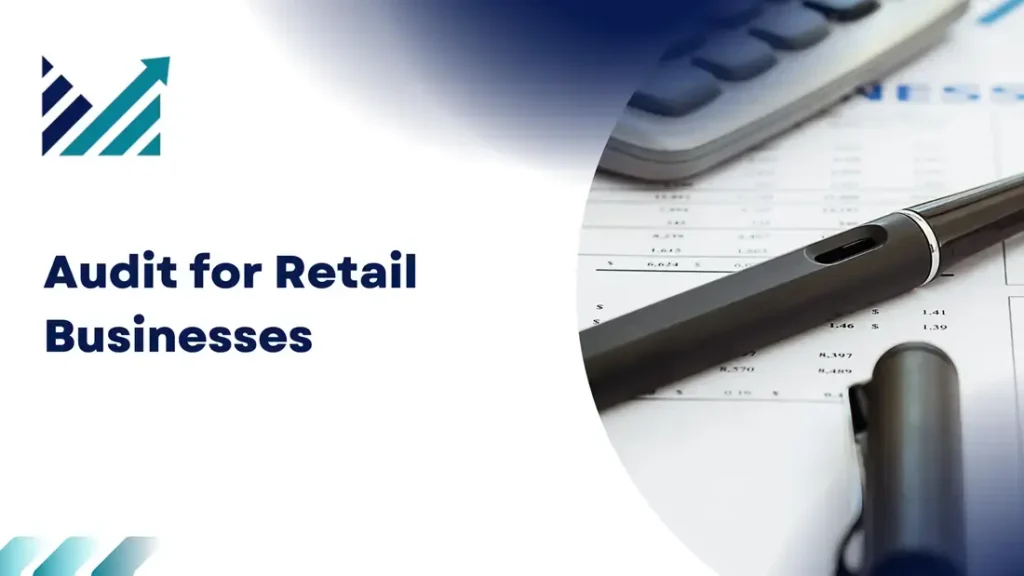
In today’s competitive retail environment, running a successful retail business requires more than just selling products. Retailers must handle complex regulations, manage risks, and ensure financial transparency. This is where audit and advisory services for retail businesses become essential.
Whether you’re operating a single store or managing a large retail chain. Having an external auditor and strong internal audit processes can make a significant difference. Let’s explore why audits matter in the retail sector, what the process looks like, and how advisory services help you stay compliant and competitive. Especially if you’re operating in regions like the UAE, where regulatory requirements are strict.
The Role of Auditors in the Retail Sector
Retail businesses face unique operational challenges. These include high transaction volumes, complex inventory management, seasonality, and evolving consumer preferences. Auditors help retailers manage these challenges by:
- Reviewing financial statements for accuracy.
- Assessing internal controls over sales, cash handling, and inventory.
- Providing independent assurance to owners, investors, and regulators.
- Offering recommendations to improve operational efficiency.
External auditors look beyond numbers. They evaluate the systems and processes that keep your business running smoothly. Their insights help retailers identify inefficiencies, strengthen controls, and reduce risk.
In addition to financial auditing, many retail businesses also engage auditors for internal audit services. This helps monitor day-to-day operations, assess compliance, and detect fraud early.
Benefits of External Audit for Retail Businesses
An external audit is not just about compliance it offers multiple benefits that directly impact retail performance:
1. Increased Credibility
External audits enhance the credibility of your financial statements. Investors, banks, and other stakeholders feel more confident working with a retail business whose finances are independently verified.
2. Fraud Prevention
Retail businesses handle large amounts of cash and inventory. External audits can help detect and prevent fraudulent activities by reviewing internal controls and spotting red flags.
3. Better Business Decisions
An audit provides reliable financial data. With accurate numbers, retail managers and owners can make better-informed decisions on inventory purchasing, expansion, and budgeting.
4. Compliance Assurance
In markets like the UAE, retail businesses must comply with local laws and tax regulations. An external audit helps ensure compliance and reduces the risk of penalties.
5. Operational Improvement
Auditors often identify inefficiencies in processes like inventory management or cash handling. Implementing their recommendations can reduce waste and improve profitability.
In summary, an external audit is an investment that delivers peace of mind, protects assets, and supports long-term growth.
Helpful for you: External Audit in UAE
Auditing Process for Retail Companies
Auditing a retail company follows a structured process. While each engagement may vary based on business size and complexity, the typical audit process includes:
Step 1: Planning
The auditor gains an understanding of the retail business, its operations, and key risks. They identify critical areas like inventory, revenue recognition, and cash handling.
Step 2: Risk Assessment
Auditors evaluate internal controls and identify areas where material misstatements could occur. For retail businesses, this often includes high-risk areas such as inventory shrinkage, revenue cut-off, and vendor payments.
Step 3: Fieldwork
Auditors perform detailed testing:
- Verifying physical inventory counts.
- Reviewing point-of-sale (POS) data.
- Checking sales returns and discounts.
- Analyzing vendor invoices and payment records.
Fieldwork ensures that reported financial data aligns with actual operations.
Step 4: Reporting
After completing fieldwork, auditors prepare a report summarizing their findings. This includes the audited financial statements and any recommendations to improve internal controls.
Step 5: Follow-Up
Retailers often work with auditors after the report is issued to implement recommended improvements. This helps strengthen systems and prepare for the next audit cycle.
Auditing isn’t just about ticking boxes—it’s an opportunity to make your business stronger and more efficient.
Specific Areas of Focus for Retail Companies
Auditors focus on several key areas that are particularly relevant to retail businesses:
Inventory Management
Inventory is usually the largest asset on a retailer’s balance sheet. Auditors verify:
- Accuracy of inventory records.
- Methods used for stock valuation (FIFO, weighted average, etc.).
- Physical inventory counts and shrinkage rates.
Revenue Recognition
Retail businesses have complex revenue streams: in-store sales, online sales, returns, and discounts. Auditors check that revenue is recognized correctly and consistently.
Cash Handling
Retailers handle significant amounts of cash daily. Auditors review procedures for:
- Cash deposits.
- Reconciliation between POS systems and bank statements.
- Authorization and monitoring of refunds and discounts.
Vendor Management
Auditors evaluate controls over purchasing, vendor payments, and possible conflicts of interest.
Loyalty Programs & Gift Cards
These programs impact deferred revenue and liabilities. Auditors assess how gift cards and loyalty points are accounted for in financial statements.
By focusing on these areas, auditors help retailers maintain accuracy and transparency.
Compliance with UAE Regulatory Requirements
If your retail business operates in the UAE, compliance is critical. Regulatory frameworks are designed to maintain transparency and prevent financial crimes.
Value-Added Tax (VAT)
Introduced in 2018, VAT compliance is a major area of focus. Retailers must:
- Correctly calculate and remit VAT on taxable sales.
- Maintain proper documentation for VAT audits.
- File VAT returns on time.
Economic Substance Regulations (ESR)
Retail businesses engaged in certain activities must demonstrate adequate substance in the UAE.
Ultimate Beneficial Owner (UBO) Reporting
Retail businesses must disclose UBOs to regulatory authorities to prevent money laundering.
Anti-Money Laundering (AML) Compliance
Retailers dealing in high-value goods (e.g., jewelry, electronics) must implement AML procedures.
An external auditor familiar with UAE regulations ensures your retail business stays compliant, avoiding penalties and reputational damage.
Challenges in Retail Auditing
Retail businesses face several auditing challenges:
1. High Transaction Volumes
Thousands of daily transactions increase the risk of errors and fraud. Auditors must sample data carefully to draw accurate conclusions.
2. Inventory Complexity
Managing inventory across multiple stores or warehouses, dealing with returns, and seasonal fluctuations make auditing inventory more challenging.
3. Technology & POS Systems
Modern POS systems vary widely. Integrating POS data with accounting systems and ensuring data accuracy can be complex.
4. Rapid Industry Changes
Retailers often introduce new products, services, or sales channels (like e-commerce). Auditors must adapt to these changes quickly.
5. Diverse Regulations
For multinational retailers, complying with different local regulations adds complexity to the audit process.
Retail businesses can navigate these challenges by choosing auditors experienced in the retail sector.
Choosing the Right Auditor for a Retail Company
Selecting the right auditor in UAE or advisory partner is crucial for retail businesses. Here’s what to consider:
Industry Expertise
Look for auditors with a proven track record in the retail sector. They’ll understand common risks, inventory challenges, and sales cycles.
Regulatory Knowledge
Choose auditors familiar with local laws and regulations—especially important for businesses in the UAE.
Approach & Technology
The right auditor should use modern auditing tools and data analytics to handle high transaction volumes effectively.
Reputation & Independence
A reputable, independent auditor adds credibility to your financial statements and reassures stakeholders.
Advisory Services
Beyond compliance, the right partner should offer advisory services to improve efficiency, manage risks, and support strategic decisions.
Taking the time to select the right auditor ensures your retail business benefits from more than just a compliance exercise—it becomes a strategic advantage.
FAQs
Why are Internal Audits Necessary in the Retail Industry?
Internal audits help retail businesses monitor financial operations, risk management, and compliance. They identify weaknesses in processes, prevent fraud, and improve operational efficiency.
How Does Internal Audit Help Retail Businesses Mitigate Risk?
By assessing and testing internal controls, internal audits reveal vulnerabilities in operations and finances. Auditors recommend improvements that reduce risks like fraud, inventory loss, or regulatory non-compliance.
What are some common internal control issues in the retail industry?
- Poor segregation of duties.
- Weak inventory controls.
- Ineffective cash handling.
- Inadequate feasibility studies for new store locations.
- Poor merchandise planning.
- Weak POS system controls.
Internal audits help retailers identify and correct these issues.
What are the benefits of internal audit services for retail businesses?
- Risk mitigation: Identify and address operational and financial risks.
- Improved efficiency: Streamline business processes and reduce costs.
- Compliance: Ensure adherence to local laws and industry standards.
How can retail businesses choose the right internal audit services provider?
Consider the provider’s retail industry expertise, understanding of your specific business challenges, and a proactive approach that goes beyond compliance.
Conclusion
Audit and advisory services for retail businesses are far more than regulatory requirements—they are tools to build trust, reduce risk, and drive growth. Whether you operate in the UAE or elsewhere, working with auditors who understand the retail landscape helps you stay compliant, efficient, and competitive.
By focusing on key areas like inventory, revenue recognition, and cash handling and choosing an experienced auditor retail businesses can turn audits into opportunities for improvement.
Remember: an audit isn’t just a review of the past it’s an investment in your business’s future.

